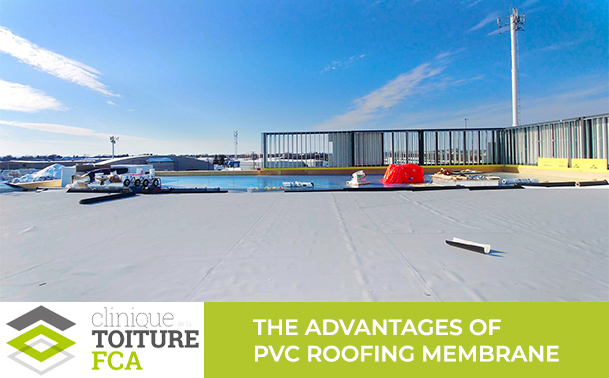
Home > Blog posts > The advantages of PVC roofing membrane
The advantages of PVC roofing membrane
When it comes to roofing systems for flat roofs, a vast choice of different materials can be used; this can make it difficult to know which is best! For example, PVC roofing membrane, which offers numerous advantages, is increasingly popular in the industrial roofing industry.
Pvc roofing membrane
Firstly, what does “PVC” mean? It is an acronym for polyvinyl chloride, a synthetic thermoplastic polymer membrane. When we speak of PVC roofing here, we are referring to a double-ply reinforced PVC membrane.
We use PVC roofing membrane for flat or barely sloped roofs. This is why it is mostly found on commercial, industrial and institutional buildings. However, it is also the perfect option for terrace roofing. It is also the ideal choice to insure proper waterproofing.
Moreover, it is a recyclable material, which makes it an excellent alternative to other materials that are less environmentally friendly.
Pvc roofing membrane: advantages for your roof
When properly installed, a PVC roofing membrane has the advantage of being 100% waterproof. This means that your roof will be protected from humidity and water infiltration, which can cause damages to its surface.
Furthermore, the membrane is resistant to extreme temperatures and weather conditions. UV rays and ice, for example, will never damage it or your roofing.
Whether the materials found under it are plywood, wood or cement, they will not deteriorate; the membrane will thus increase their durability. The PVC roofing membrane itself lasts around 30 years.
Aesthetically speaking, the PVC roofing membrane is also greatly appreciated for its modern appearance and choice in colors (often available in white, grey or beige).
How to install a pvc membrane on a roof?
PVC roofing membrane installation is generally quick and easy. However, it must be laid down in one single ply; it is necessary to remove all objects or ramps on the roof prior to installation.
It is laid directly on plywood or cement, mechanically fastened, and then fixed by hot air welding. If you wish to build a wooden roof terrace, you will need to lay plywood and install a PVC roofing membrane beforehand.
It is recommended to call upon a professional roofer. Only a professional roofer will know how to perfectly lay the membrane and insure that it is watertight.
Membrane installation
Before the membrane is laid, it is essential to insure a clean, even and smooth surface. The membrane is then glued onto the full surface; meaning the entire roof and sides. Glue is applied, then the membrane is fixed by hot-air welding, so that it is securely fastened to the roof.
PVC membrane is installed the same way as TPO membrane, which means it is induction welded. Two options are available: a RhinoBond induction welding system or a full-adhesion system.
Membrane maintenance
It is recommended to inspect the PVC membrane at least once a year, ideally before or after winter. A visual inspection or a thermography will help detect if there are any damages or repairs to perform.
Maintenance mainly consists of cleaning drains and debris; this is an easy clean, performed with a product that has been previously approved by the manufacturer.
Its surface is non-skid and dries quickly, which means that maintenance is very safe.
Pvc roofing membrane waterproofing
The PVC roofing membrane is made of a vinyl chloride and polymer tri-laminated watertight system, which makes it completely waterproof. It is also perfectly adapted to different weather conditions like rain, snow or melting snow and ice.
Moreover, it is resistant to mold, chemicals and even fires. Since a PVC roofing membrane has optimal impermeability, your roof is adequately protected from all severe weather conditions.
Pvc roofing price
PVC membrane for roofing is a great “value for money” alternative, especially given that it lasts so long.
Overall costs obviously depend on factors like: surface size, membrane thickness, as well as the amount of accessories found on the roof (which can vary greatly from one roof to another).
Other types of membranes.
The type of membrane you choose can depend on your needs, budget and the type of roof you have. Here is an idea of other membranes that could be used for your roof, as well as their main characteristics:
TPO membrane, just like the PVC membrane, it is made of thermoplastic, but with a single-ply waterproof system. Once it has reached the end of its life, it can be recycled. It is also low maintenance, although an annual or biannual inspection is recommended. Perfectly watertight and very resistant, it is a great alternative to PVC!
An elastomeric membrane is a slightly more expensive membrane. Durable and resistant, it lasts about as long as the TPO and PVC membranes. However, it cannot be recycled so it is not an environmentally friendly option.
A multi-layered asphalt and gravel membrane is a more affordable option. Water infiltration is prevented by superimposing 4 to 5 asphalt felt paper layers and then gravel. This is a good option to help protect asphalt from softening and from degradation caused by the sun. However, it does require more maintenance by a specialist. Amongst other things, gravel must be spread out, since it can move with time.
A monolithic membrane is a waterproof membrane recommended for cement roofs and inverted roof-systems. It is a type of rubberized asphalt that is referred to as “monolithic”, since it is laid without joints.
An EPDM membrane is obtained through a mixture of resistant synthetic rubbers. It is an environmentally friendly alternative, since material is both durable and recyclable. However, it is not compatible with roofing containing asphalt, as the asphalt can cause damage to it.
As you can see, membrane choices are numerous. It is important to take into account value for money, durability, the environmentally friendly aspect (which is not to be ignored) and necessary maintenance. All membranes are not compatible with every roof; this is also another factor to consider.
Still unsure?
Let us help you select the best membrane option for your roof. Clinique de la toiture FCA is available by phone, online contact form or email, to guide you towards the best possible choice for you.
Our last bit of advice: if what you are looking for is a job well done and a perfectly watertight roof, ask a team of experienced professionals for their help!
Need help?
Leave us your email address and we will contact you as soon as possible to assess your needs!
Put an end to your water infiltration your clogged drains your roof problems
Leave us your email address and we will contact you as soon as possible to assess your needs!
